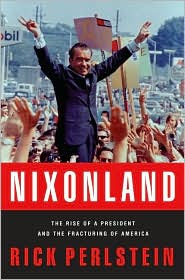Perlstein on Trump, Clinton and the future of the “conservative” movement

Rick Perlstein, the author of Nixonland, The Invisible Bridge, and Before the Storm (I’ve read the first two; they’re both great books), is interviewed by Isaac Chotiner. A couple of excerpts:
I’m kind of famous for coming up with a little epigram, “Conservatism never fails. It is only failed.” I came up with this during my long experience of studying the right, and realizing that basically anything that is politically successful is kind of labeled conservatism. Any failure is wiped off the books in this bad faith utterance that well, of course it failed because it wasn’t conservative. Romney wasn’t conservative enough. McCain wasn’t conservative enough. “Bush wasn’t conservative,” you began to hear in 2004, when the wheels came off the bus with Iraq, and all the rest.
That’s what we’ll hear, “Of course, Trump lost. He wasn’t conservative.” That allows everyone else in the Republican Party, basically, to push the infamous reset button. I think a lot of what we saw in the last couple of weeks with Trump’s various former supporters jumping ship, ostensibly because of this grotesque tape and the rest, is all about setting up that next move in the chess game. Everyone who has paid any kind of attention knew that Trump was this kind of guy in the first place. I think what we’ll see is the Paul Ryans and the Ted Cruzes, jockeying for the position of King of Conservatism saying, “We need to wipe the slate clean and go back to Reagan.” The dilemma that raises is that Trump has raised energies in the Republican electorate that may not be able to be so easily contained.
My father-in-law escaped Nazi Germany in 1939. My wife pointed out to him that if Trump was a decent family man who was able to discipline himself and was able to execute a smart campaign strategy that was designed by a sophisticated strategist … and my father-in-law cut her off. He said, “He would be a shoo-in.” And that’s the fear. This was the fear that you saw a lot in the decades after the European catastrophe of fascism, the fear that a demagogue who kind of broke the norms of American politics would have it easy, that it really was this sort of scrim of civility that kept the demons at bay.
You see it a lot in the correspondence of Lyndon Johnson when he’s agonizing over going into Vietnam. He would always talk about what happened in 1950 when McCarthy and the rest accused the Democrats of losing China. You saw Richard Nixon saying, “Sure, I’ve got to be tough, and basically do all of these demagogic things, because if I don’t, the real demagogues are going to come along.”
There are these sort of wildfires that can break out unless you have responsible grown-ups in charge of the Republican Party. They always understood that the forces that they were playing with were dangerous. This is why we see someone like George W. Bush going to a mosque the week after 9/11. I think he understood. He blundered into calling it a crusade, but he backed off right away. He wasn’t that smart and didn’t understand this language, but he was very careful not to turn this into a crusade against Muslims, because he knew if it did, we’d be seeing what we’re seeing now. As Sam Rayburn said about politics, anyone can knock down a barn, it’s building a barn that’s hard.


